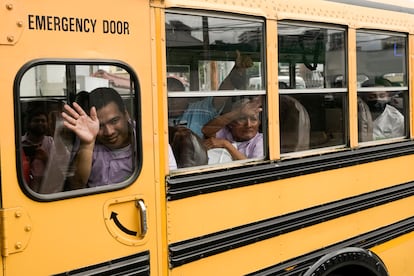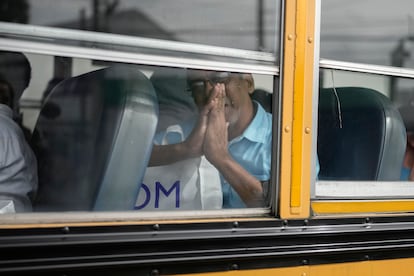The release of 135 political prisoners from Nicaragua: “They got off the airplane saying, ‘God bless America and Guatemala’”
The Ortega and Murillo regime is staying silent and refusing to release the official list of the formerly incarcerated individuals who were sent to the South American country. The operation was carried out in total secrecy by the U.S. embassy in Managua


Once again, the prison gates of the Daniel Ortega and Rosario Murillo regime were unlocked at dawn to release political prisoners. This time, as the sun rose on September 5, 135 members of the opposition to the Sandinista administration — among them, religious evangelicals, Catholic laypeople, students and activists — were released from their cells and driven to Managua’s international airport, where a plane chartered by Joe Biden and Kamala Harris’ government was waiting to take them to Guatemala towards not just liberty, but the start of their exile.
The scene was similar to that of February 9, 2023, when an operation that liberated 222 former political prisoners — the principal leaders of the opposition and former presidential hopefuls — was carried out in total secrecy. The main difference with the September release is that the 135 individuals were not brought to the United States, but to Guatemala, where President Bernardo Arévalo’s administration received them at La Aurora international airport.
A source close to Arévalo who was consulted by EL PAÍS said the entire operation, “was well-planned by the U.S. embassy in Managua.” Arévalo’s administration signed off on the plan and oversaw some of the logistics involved in receiving the released Nicaraguans. In the afternoon, hours after their short flight from Managua landed in Guatemala City, the U.S. and Guatemalan governments held a joint press conference in which they shared few details regarding the operation.
According to Eric Jacobstein, Deputy Assistant Secretary in the Bureau of Western Hemisphere Affair, the political prisoners received medical attention on the plane. “We did find them generally in very good health and spirits. These individuals came off the plane saying ‘God bless America,’ ‘God bless Guatemala’ – extremely grateful,” he said at the press conference.

Jacobstein said that Guatemala was chosen as the destination for the 135 political prisoners because Arévalo’s administration is “continuing to demonstrate democratic leadership in the region.”
Prior to the press conference, national security advisor Jake Sullivan stated that the U.S. Congress was working on the release of 13 members of Puerta de la Montaña, an evangelical church based in Texas, whose pastors and members were accused by the Ortega and Murillo administration of money laundering.
However, Nicaragua — led by President Ortega and his wife, Vice President Murillo — didn’t just agree to liberate the 13 evangelicals, but also added 122 other political prisoners to the list. A similar move took place when the 222 prisoners were released in February 2023. According to Ortega himself, it was his “co-president” — as he refers to his wife — who told the U.S. ambassador in Managua, Kevin Sullivan, that they would liberate all the political prisoners.
Ortega and Murillo, in complete silence
As of September 5, 151 people were detained for political reasons and religious persecution, according to Nicaragua’s Mechanism for Recognition of Political Prisoners. Of is number, 126 are men, 25 are women, and 25 are senior citizens.
Neither the mass release in 2023 nor the latest liberation involved political negotiation between Managua and Washington, D.C., according to the White House. As of publication, the Sandinista government has maintained total silence about the operation. The presidential couple has not released a complete list of freed prisoners, which has caused concern among the families of the political prisoners, given that according to the Mechanism’s data, 16 detainees remain in the country.
For example, it is unknown whether Indigenous legislator Brooklyn Rivera was on the flight to Guatemala, in addition to his number two in the regional Yatama political party, legislator Nancy Hernríquez. Rivera was forcefully disappeared after his detention, a repressive pattern that has been identified among the arrests made by the country’s Legal Defense Unit (UDJ). Family members as well as human rights organizations have requested proof of life for various detainees on several occasions. Other political prisoners undergoing “forced disappearance by concealment of whereabouts,” such as journalist Fabiola Tercero, were identified in photographs distributed by the office of the Guatemalan president.

Despite requests by human rights advocates for the official list of the 135 political prisoners who were released, Guatemala and the United States said the names will not be made public for security reasons. Some have been identified after managing to contact their family members to alleviate their concerns after they arrived in Guatemala City.
Jacobstein stated at the press conference that the release of the political prisons will not affect the United States’ policy regarding Ortega and Murillo’s dictatorship. “I do want to emphasize that this does not signal a change in our policy toward this repressive regime […] We believe that only Ortega and Murillo can control the freedom of these individuals, so we urge them to immediately and unconditionally release all political prisoners and prisoners of conscience in Nicaragua.”
Uncertainty as to citizenship
Amid the regime’s silence, there is also doubt as to whether the individuals who were exiled to Guatemala will be stripped of their Nicaraguan citizenship, as happened with the 222 political prisoners during their flight on February 9, 2023. The official said that he did not know whether the Ortega administration would make the same decision, but did warn that the past move was “extremely troubling.” He went on to say that the United States has its doors open to negotiations for the exit of more political prisoners and that Nicaragua’s “is a government that continues to imprison individuals for exercising their fundamental freedoms.”
Political analysts consulted by EL PAÍS did not completely rule out the possibility that the presidential couple would strip the 135 people of their citizenship. The removal of citizenship is indicated for the political crime of “betrayal of the country.” The conviction’s principal punishment involves the confiscation of all assets of those declared guilty.
Last week, before the 135 political prisoners were removed from incarceration and sent to Guatemala, the Sandinista government approved a penal reform that allows for Nicaraguans and foreigners outside of the country to be prosecuted, with penalties ranging from life in prison to confiscation of assets of those convicted of crimes such as money laundering, committing and financing terrorism, cybercrimes and any offense against the state. In other words, the charges that the presidential couple has filed against its critics since 2018, when massive protests broke out in opposition to their administration.
“I am not ruling out the possibility that they strip them of their citizenship like that of the 222, but removing someone’s nationality involves a great political cost on an international level for the regime. And to be frank, the primary punishment of being declared a traitor to the country, that you are no longer Nicaraguan, is that they seize all your assets. That’s something that can be easily done with the reform to the penal code, with less fuss than rendering more of their opponents stateless,” said a political analyst who requested anonymity.
The 135 Nicaraguans have been received by President Arévalo’s administration. They have been given permission to remain in the country for 90 days while they decide which immigration processes they want to undergo. Jacobstein said that his government would be open to granting them visas to travel to the United States and that there, they could begin the process of applying for refugee status.
Sign up for our weekly newsletter to get more English-language news coverage from EL PAÍS USA Edition
Tu suscripción se está usando en otro dispositivo
¿Quieres añadir otro usuario a tu suscripción?
Si continúas leyendo en este dispositivo, no se podrá leer en el otro.
FlechaTu suscripción se está usando en otro dispositivo y solo puedes acceder a EL PAÍS desde un dispositivo a la vez.
Si quieres compartir tu cuenta, cambia tu suscripción a la modalidad Premium, así podrás añadir otro usuario. Cada uno accederá con su propia cuenta de email, lo que os permitirá personalizar vuestra experiencia en EL PAÍS.
¿Tienes una suscripción de empresa? Accede aquí para contratar más cuentas.
En el caso de no saber quién está usando tu cuenta, te recomendamos cambiar tu contraseña aquí.
Si decides continuar compartiendo tu cuenta, este mensaje se mostrará en tu dispositivo y en el de la otra persona que está usando tu cuenta de forma indefinida, afectando a tu experiencia de lectura. Puedes consultar aquí los términos y condiciones de la suscripción digital.








































